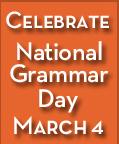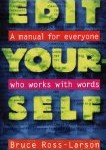Confessions of a grammar ignoramus
Many people think of me as a grammar expert. I can see why. After all, I’ve shared many blog posts and social media updates that touch upon grammar. However, I know the truth. I’m no expert.
My history with grammar began in a conventional way, with English classes in a suburb of Rochester, N.Y. The classes challenged me. My brain didn’t seem to think in terms of the rules. However, I slowly absorbed them. As I recall, I was a B student in my high school English classes. They weren’t my strength.
Then, educational reform hit. My high school switched to teaching what it called “linguistics” instead of grammar in English class. It was a totally different approach to understanding sentence structure. It wish I could say that linguistics clicked with me in a way that traditional grammar did not. Nope. The only thing I remember from those classes is the word “morpheme.” However, I didn’t remember what it means. I had to use Google to find that Wikipedia defines it as “the smallest grammatical unit in a language.”
The result of my high school’s switch? I learned neither system. If you ask me to explain either system’s approach to sentence structure, I’ll give you a blank stare or run to my computer to do an online search.
However, I eventually came to understand many of traditional grammar’s rules. I haven’t achieved this through an intensive study of grammar rules. That strikes me as a time-consuming exercise in memorization. Instead, I’ve learned by fixing problems in my writing, with help from other people’s feedback and my research.
I’ve unconsciously absorbed good grammar by reading and applying other people’s feedback on my writing. I’ve received this feedback in writing classes and writing groups, where teachers and peers tell me what works and what doesn’t. I’ve also received it in one-on-one exchanges with editors and friends. The people who gave me feedback typically didn’t mention grammar in their feedback, but they pushed me toward writing in a more grammatical, reader-friendly way.
My grammar research has been spurred by the realization that I don’t know grammar well enough to decide what’s right. Sometimes a Google search is enough to answer my questions. Other times I turn to my favorite reference books or online resources for grammar, punctuation, and usage questions. Sometimes I turn to writers forums or friends because I’m not sure what to input into the search box—or to seek in the index—to find the answers to my questions. Some of my blog posts about grammar, punctuation, and usage have originated with my trying to answer questions raised by my writing or the questions of my readers. My question-inspired blog posts include “How do you make Degas possessive?,” “That vs. which: Which is right?,” and “Proper usage of periods: One space or two?”
My inadequate knowledge of grammar has made me feel sympathy for other people’s struggles with writing. It’s not easy to get things right, especially if you haven’t received good training.
I still have a lot to learn. For example, I struggle with when to use commas in long, complex sentences. That’s a tough topic to understand. Putting commas in the right places requires making many judgments. Once I figure out the answer, I’ll share it here.
Thank you for sticking with me as continue my quest to better understand grammar!
Image courtesy of Stuart Miles at FreeDigitalPhotos.net





